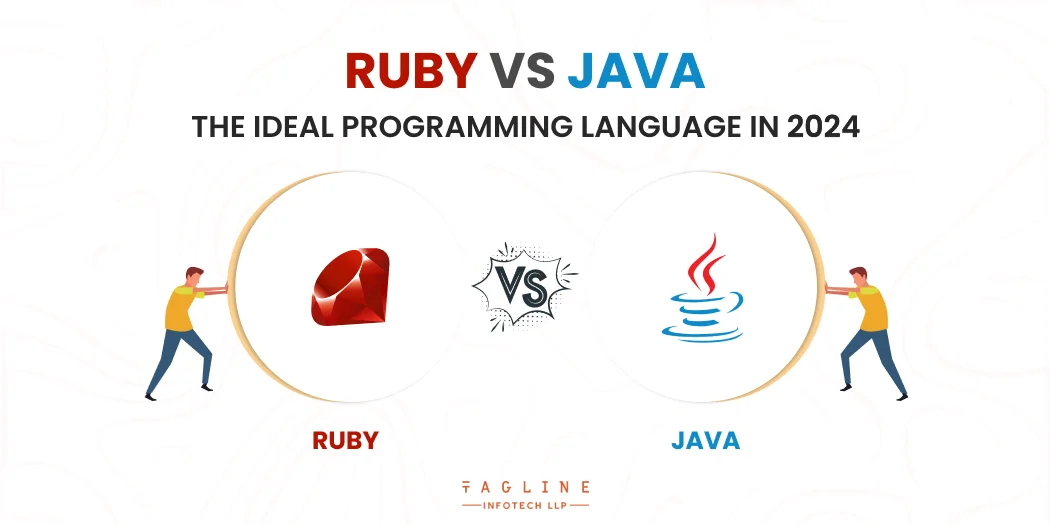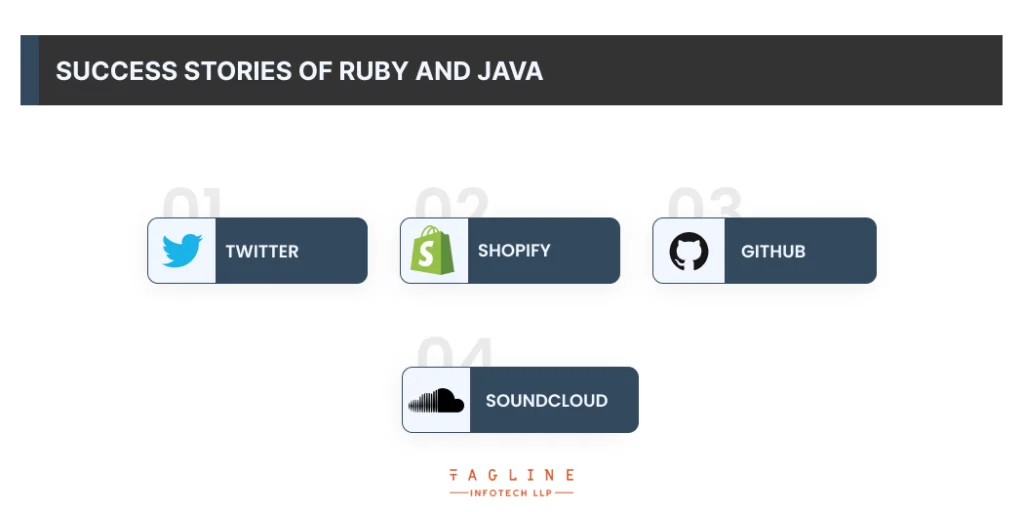What is the best way to format Python...
July 3, 2025
Home >> Web Development >> Ruby vs. Java: The Ideal Programming Language in 2024

In the ever-evolving landscape of programming languages, the choice between Ruby vs. Java stands out as a pivotal decision for developers in 2024.
Ruby, with its elegant and expressive syntax, offers smooth code readability and a vibrant community.
Meanwhile, Java, known for its robustness and portability, continues to power enterprise-level applications.
Striking the perfect balance between simplicity and attractiveness, this showdown invites programmers to explore the dynamic creativity of Ruby or harness the stability of Java, shaping the future of software development in an exciting and accessible manner.
Ruby is a dynamic, open-source, object-situated, and intelligent programming language.
People view Ruby as similar to Perl and Smalltalk programming dialects.
It runs on a wide range of stages like Windows, Macintosh operating system, and all variants of UNIX.
It is a completely object-situated programming language. Everything is an item in Ruby.
Every single code has its properties and activities. Here, properties allude to factors, and activities allude to techniques.
People consider Ruby to follow the rule of POLA (guideline of least surprise). It implies that the language acts in such a manner to limit the disarray for experienced clients.
Java is a generally involved programming language for coding web applications.
Designers have chosen Java for over 20 years, and many Java applications are still widely used today.
Java is a multi-stage, object-oriented, and network-driven language that developers can use as a platform itself. This programming language is fast and safe.
You can use it for coding various applications such as mobile apps, enterprise software, data apps, and server-side technologies.
Both Ruby vs. Java are leading programming languages used for web application development. Ruby is known among developers due to its ease of development and simplicity. Java is an object-oriented programming language that is popular for its robustness and scalability.
| Topic | Ruby | Java |
|---|---|---|
| Language Types | Ruby is a dynamic, interpreted scripting language with a strong emphasis on simplicity and productivity | Java is a statically typed, object-oriented programming language that boasts a comprehensive feature set and a sturdy type system. |
| Developed By | Yukihiro Matsumoto | James Gosling |
| Scalability | Ruby might face scalability issues for large-scale applications due to its interpreted nature. | Java is extremely scalable and commonly utilized in enterprise-level applications. |
| Frameworks | Ruby on Rails is a popular and powerful | Java has a wide range of frameworks |
| Libraries | Java is a statically typed, object-oriented language with a rich set of features and a robust type system | libraries like Spring, Sleep, and Apache Swaggers, empowering designers to fabricate strong and highlight-rich applications. |
| Compilation | The runtime interprets Ruby code, which can result in slower execution. | The Java Virtual Machine (JVM) translates Java code into bytecode and runs it, thereby enhancing speed efficiency. |
| Flexibility | Ruby offers a high degree of flexibility. | People know Java for its adaptability. |
Ruby vs. Java are both strong programming dialects, yet they have various qualities and shortcomings. The following are a few upsides and downsides of Ruby versus Java in light of the query items:
Pros of Ruby
Cons of Ruby
Pros of Java
Cons of Java
Which Language Will Enhance the Development of Your Projects?
Hire our expert developer to Ignite Your Projects with the Optimal Programming Direction and Create Seamless Solutions.
Ruby is a dynamic, elegant language ideal for startups or small projects. It’s concise, expressive, and beginner-friendly, making coding enjoyable and swift.
Use Ruby when you want to develop web apps with a smooth, rapid prototyping process and maintainable codebase.
You may need to outsource ruby on rails development to develop some of the most intuitive and best performing RoR solutions.
On the other hand, in the Java vs. Ruby on Rails debate, Java is a powerful, versatile language suitable for large-scale, enterprise-level applications.
It provides robust performance, security, and scalability, making it perfect for mission-critical systems.
Choose Java when you require high-performance and complex, long-term projects.
In the world of programming magic, Java and Ruby hold enchanting spells of their own. But can we unite these sorceries for greater wonders? The answer is a resounding “Yes!” Java and Ruby can join forces through JRuby, a charming gem that bridges the gap.
JRuby conjures Java’s strength with Ruby’s elegance, allowing developers to weave a symphony of creativity and performance.
Embrace the magic of JRuby, where the might of Java intertwines with the beauty of Ruby, creating a spellbinding harmony that unleashes the full potential of your software endeavors.
Let’s compare Ruby vs. Java and look at some important things to know about this great language.
Ruby:
Java:
Also Read : Why Ruby on Rails Is Still a Good choice in 2024?

We should take a gander at the genuine instances of Ruby and Java and how they benefit the applications.
This web-based entertainment platform Twitter is an ideal instance of involving Ruby vs. Java in their application.
At first, they involved Ruby for backend advancement, which benefits them to expand efficiency and further develop improvement productivity.
Later, Java helped Twitter handle large amounts of data and improve complex calculations with its efficient backend systems.
Shopify
In this internet business stage, Shopify has integrated Java and Ruby to improve application execution.
Ruby was utilized for backend improvement, giving center usefulness like stock administration and request handling.
Java oversees complex estimations and incorporates with outer frameworks and parts.
Github
This code cooperation stage has utilized Java and Ruby to perform productive advancement processes.
Ruby was utilized for the front end and different application parts.
Java was integrated for vital backend frameworks dealing with enormous scope information handling.
SoundCloud
This sound smoothing-out stage uses Java and Ruby to offer a consistent client experience.
Developers use Ruby for specific APIs and web services that ensure the rapid development of UIs.
Java guarantees execution advancement, adaptability, and excellent sound smoothing out encounter
Picking either Ruby or Java depends upon your task’s necessities.
Ruby is great for new businesses and little undertakings, offering effortlessness, adaptability, and a fast turn of events.
Java is more qualified for huge scope, endeavor-level applications, giving execution, security, and adaptability.
Consider the particular necessities and extent of your venture to pursue the right innovation decision.
When choosing between Ruby vs. Java, it ultimately depends on the specific needs and scope of your project.
Ruby, with its effortlessness, adaptability, and quick improvement capacities, is a brilliant decision for new companies and little ventures.
It succeeds in web application improvement and is great for prototyping and projects that require regular element changes.
Then again, Java’s solidarity lies in its strength, adaptability, and execution, making it appropriate for enormous-scope, endeavor-level applications.
It is a solid decision for strategic frameworks and undertakings with perplexing, long-haul necessities.
Lastly, the choice between Ruby and Java should line up with your task’s goals and advancement needs.
If you are looking for a Ruby on Rails development company, there are several options available. They specialize in building web applications using the Ruby on Rails framework. You can ensure that your project is in capable hands and benefit from their experience in building robust web applications.
Indeed, Ruby is slower than Java. At runtime, the interpreter deciphers Ruby code, while Java compiles code into bytecode, resulting in faster execution speeds for Java.
Ruby is much of the time a favored decision for new companies because of its effortlessness, adaptability, and speedy improvement capacities. It permits new companies to model and emphasize their thoughts quickly.

Digital Valley, 423, Apple Square, beside Lajamni Chowk, Mota Varachha, Surat, Gujarat 394101
D-401, titanium city center, 100 feet anand nagar road, Ahmedabad-380015
+91 9913 808 2851133 Sampley Ln Leander, Texas, 78641
52 Godalming Avenue, wallington, London - SM6 8NW